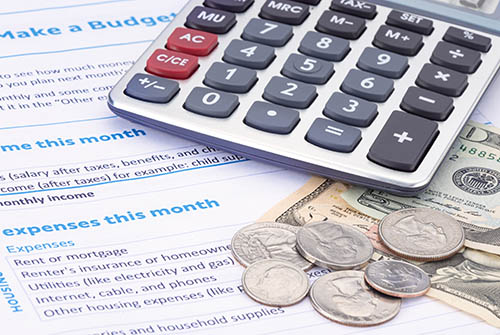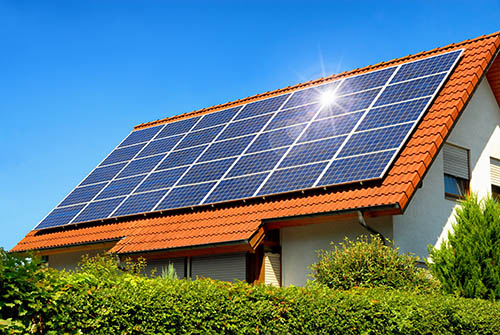Buying a Home This Autumn? 4 Unconventional Ways to Save up for Your Down Payment
 Autumn is a popular time for new home buyers to start looking for their first house or condo. But with that down payment looming, everybody could use a bit of help saving up to make that bulk payment a little less intimidating.
Autumn is a popular time for new home buyers to start looking for their first house or condo. But with that down payment looming, everybody could use a bit of help saving up to make that bulk payment a little less intimidating.
There are plenty of unconventional ways to save up that may seem small, but will quickly add up and put a dent into that down payment.
Create A High Interest Savings Account
Talk to the bank about creating a secondary savings account with a higher interest rate. These super savings accounts usually come with the caveat that no money can be removed for a designated period of time. Using this account for the down payment works in everybody’s favor because it guarantees those extra dollars cannot be used for any other purpose.
Discard One Guilty Pleasure
Enjoy Starbucks coffee? Grab a pint every happy hour? Choose one vice and put the amount that would be spent on it into a jar. Most people will be surprised on how much money they spend each month on one guilty pleasure that can easily be cut out of their life. Every perk that’s cut will increase the amount by a decent margin.
Put Away Any Bonus Money
Holiday bonuses from work, tax refunds, birthday or Christmas presents, income from side gigs, any and all extra dollars that come in from any source outside of the main paycheck should be considered ‘down payment dollars.’ Sure it’s tempting to use that nice bonus or tax refund on a weekend trip or a night out, but all extra income should be saved away for that initial down payment.
Bring On The Roommates
People who already own a home and are looking to relocate can take this unconventional approach. Decent housing is hard to find so anybody with an extra room can rent it out and put that money towards the new house. Having a roommate can be a pain, but it’s for a limited time and can add up quickly.
While saving for a down payment can be stressful, you don’t have to go through the process alone. Your trusted mortgage professional will be able to guide you and provide some helpful tips for how to make that down payment without breaking the bank. These men and women have seen countless couples go through the same thing and their experience can make a world of difference.
Buying a New Home? Use This Checklist to Ensure Your Finances Are in Order
 Buying a home is a significant expense. It doesn’t matter whether you’re a first-time buyer or have experience. Unless you have a large pile of cash, you’ll need to ensure your finances are in order before closing. In this post we’ll explore four financial items you’ll want to check off before buying a new home.
Buying a home is a significant expense. It doesn’t matter whether you’re a first-time buyer or have experience. Unless you have a large pile of cash, you’ll need to ensure your finances are in order before closing. In this post we’ll explore four financial items you’ll want to check off before buying a new home.
Figure Out Your Current Monthly Budget
First, you’re going to want to sort out your monthly budget. If you’ve never done a budget before, start with something basic. Open up a spreadsheet or take out a piece of paper. Make two columns: ‘income’ and ‘expenses’. Fill in each column with the amounts that you make or spend each month. Bank, credit card and other statements can help with this process. It’s a good idea to go back at least 3 months to ensure you’re capturing your true spending.
Make A Debt Management Plan
Do you have any debts? If so, you’ll want to make a plan for how you’re going to manage these when you buy a new home. For example, you may have a car payment, student loans, a line of credit or credit card debt. Write down your debts, how much you owe and when payments are due. If any debts are due monthly, make sure you include those in your budget.
Keep in mind that your outstanding debts may impact your ability to borrow for a mortgage as well. If you plan on taking out a mortgage to pay for your new home, it’s best to get your debts figured out beforehand.
Understand All Your Real Estate Costs
Next, you’ll want to determine what all your real estate costs are going to be. If you’re not yet close to the bidding or closing process, this might be a bit challenging. But ask your real estate agent for a breakdown of what you can expect to pay for a home in your price range.
Set Up An Emergency Savings Cushion
Finally, you’ll want to set up a financial cushion in case of emergencies. It’s not much fun to think about, but losing a job or having a health event is possible. Most financial experts recommend having at least six months of expenses saved up. Of course, this is always easier said than done. What’s important is that you have at least some cash tucked away, just in case. If you can, save a bit extra each month or from each pay check and add to this emergency fund.
When you’re ready to buy a new home, your trusted mortgage professional is your best bet for success. Reach out to us today and learn more about how affordable a new home in your community will be!
First Time Home Buyers: 3 Essential Tips That You Won’t Hear from Your Friends
 When it comes to diving into home ownership for the first time, it can seem like there are so many things you just don’t know. Whether you’re getting advice from your real estate agent, your friends or your family, there are so many things that seem like common sense that they might be lost in the mix of details. Instead of having to squeeze it out of them, here are three tips that are easily forgotten but still essential.
When it comes to diving into home ownership for the first time, it can seem like there are so many things you just don’t know. Whether you’re getting advice from your real estate agent, your friends or your family, there are so many things that seem like common sense that they might be lost in the mix of details. Instead of having to squeeze it out of them, here are three tips that are easily forgotten but still essential.
Be Patient And Take Your Time
It’s certainly not the most popular advice, but one of the most important things when deciding to purchase a home is having the time and know-how to make the decision that is right for you. Since you’ll need to consider so many different things when committing to such a significant purchase, from the neighborhood to the local amenities to the future salability of the home, it’s always best to ask the questions so there will be less to regret.
Get More Than One Opinion
It’s entirely possible that you’ve found a home you love and there’s nothing that’s going to get between you and it, but getting someone else’s opinion may provide the criticism you need to take a step back from a home-buying mistake. Instead of going it alone, bring along a friend or family member whose opinion you trust that will be honest with you about the flaws they see. It’s possible that they may notice something you’ve missed that could make or break the entire deal.
Prepare For The Home Inspection
Until you do it, you never really know what you’re going to find out during the home inspection, but doing a little bit of research to determine things you should be looking for can go a long way in saving money down the road. It may seem like you should be able to rely on the inspector to assess things for you, but by asking the right questions you might be able to spot the water tank that’s about to give out or a leak that’s about to get much worse.
There are a lot of little details that go hand in hand with purchasing a home, but often the advice that is the simplest is the easiest to forget.
Buying a Solar-Powered Home? Watch Out for These Symptoms of Future Problems
 Solar-powered homes are becoming more commonplace, and are an excellent step in the right ecological direction. That said, there are some aspects to consider if you’re thinking about investing in solar energy. Read on for some salient points about living by the sun.
Solar-powered homes are becoming more commonplace, and are an excellent step in the right ecological direction. That said, there are some aspects to consider if you’re thinking about investing in solar energy. Read on for some salient points about living by the sun.
The Sun And The Economy
As solar power has grown in popularity, the government has introduced incentives to help homeowners combat the once-high costs of purchasing and installing solar panels. And companies are springing up to rent you panels and cover the cost of installation. This means that your initial costs are smaller, but also that those third party companies reap the government incentives and may not always maintain strong relationships between you and your utility company.
The Sun And Your Roof
Roofs are the primary locations for solar panels, particularly on homes. Ensure that your roof has enough strength for the added weight of the equipment, and enough space for the proper placement (away from the edges, for example). The equipment comes with a lifetime guarantee so if the roof it’s on is already old, consider updating it before installation (which is an extra but necessary cost).
The Sun And Your Surroundings
A solar-powered home is all about location, location, location. Watch for tall and shady trees, or for high buildings that will shadow your panels and decrease or prevent their output. Look forward, too are there any plans for development in your neighborhood that would introduce such impediments in the future?
The Sun And Cloudy Days
The most obvious hiccup with solar power is that bane of a sunny existence: cloudy days. Location has influence here too: the climate of your area will determine how many panels you’ll need, where you’ll need to place them and how much energy you’ll be able to glean in each season. There are batteries you can purchase for collecting and storing solar energy but they’re still an expensive option. And solar power is still somewhat unattractive in the global economy because of how variable it is. Fossil fuels are more dependable, and therefore more marketable, than an energy source so tied to the weather although that looks to change if solar energy continues its rise in popularity with the masses.
All things considered, there is a deep and growing draw to solar-powered homes, but don’t enter into anything without looking at all sides of the equation. If you have questions, or want to know more about how solar energy works in your neighborhood, contact your local mortgage professional.
- « Previous Page
- 1
- …
- 19
- 20
- 21
- 22
- 23
- …
- 39
- Next Page »

